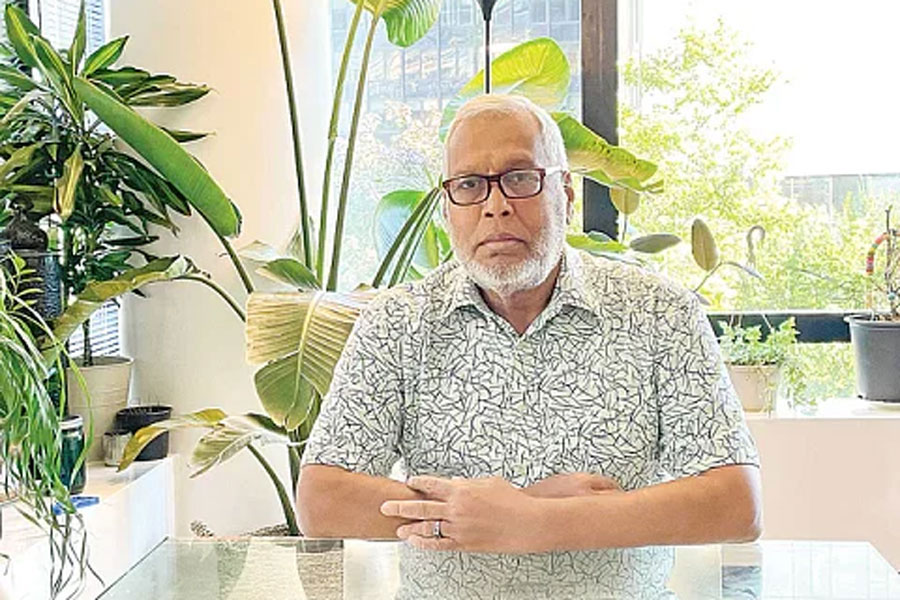
Published :
Updated :

Energy Adviser Dr Muhammad Fouzul Kabir Khan stressed on Saturday the need for indigenising Bangladesh's development efforts, highlighting key policy reforms that have already yielded tangible benefits in the transportation sector.
He said the government was trying to develop a nationally integrated, multi-modal transport sector master plan, aiming to address longstanding infrastructural gaps by focusing not only on roads but also on the country's neglected maritime and rail networks.
Speaking at a freshers' reception, Dr Kabir highlighted the country's heavy reliance on foreign expertise in infrastructure development. "Our buildings, railway lines, power plants -- all are largely designed and built by foreigners, mainly the Chinese and Indians," he said. "We must take ownership of our development."
North South University (NSU) organised the event and welcomed incoming students at the vibrant summer semester orientation programme.
The event, designed to introduce freshers to the university's academic structure, values, and vibrant campus life, was marked by inspiring speeches, scholarship awards, and cultural performances.
The function was also attended by special guest Azim Uddin Ahmed, chairman of the Board of Trustees of North South University (NSU). The session was chaired by Professor Abdul Hannan Chowdhury, Vice-Chancellor of NSU. Other members of the Board of Trustees of NSU were also present at the programme.
Speaking on the occasion, Dr Kabir also noted that although foreign-led projects built infrastructure, they often failed to meet local needs. Referring to the multi-billion-taka tunnel in Chattogram, he said, "It cost over Tk 100 billion, yet hardly any traffic uses it. That's why we need to indigenise -- to ensure our money is spent well and serves our purpose."
Dr. Kabir cited the lack of proper access at Sadarghat as an example of poor planning. "There is a launch terminal, but there's no proper way to get in or out efficiently," he pointed out. "We need to fix these broken connections."
Turning to public transport, Dr. Kabir praised improvements in train travel logistics. "Most trains left on time, and people no longer had to climb through windows. These are practical examples of what we are trying to institutionalise."
With national elections expected in December -- or by June if not earlier -- Dr Kabir acknowledged the time was short for large-scale development. "But we are setting examples and creating templates that the next government can follow."
Azim Uddin Ahmed said, "Standing here today brings back many memories. I have addressed students and parents from this stage many times before. Congratulations to all the new students of NSU. I sincerely hope you all go will far in life."
Professor Abdul Hannan Chowdhury said, "For over thirty years, this campus has been home to the country's leading private university, as recognised by THE and QS rankings. We focus not only on academic excellence but also on holistic development through over 30 active student clubs and engagement opportunities. Our goal is to produce not just graduates, but ethical, sincere, and morally responsible individuals. I urge all students to follow NSU's rules and guidelines, which will help shape you into highly valued members of society."
NSU Treasurer and Pro Vice-Chancellor (IC) Professor Abdur Rob Khan delivered the vote of thanks. The programme concluded with a captivating cultural performance by members of the North South University Shangskritik Shangathan (NSUSS).
Professor Md Rizwanul Islam, Dean of the School of Humanities and Social Sciences, Professor Shazzad Hosain, Dean of the School of Engineering and Physical Sciences, Professor Dipak Kumar Mitra, Dean of the School of Health and Life Sciences, and Professor AKM Waresul Karim, Dean of the School of Business and Economics, introduced their respective schools.
sajibur@gmail.com


 For all latest news, follow The Financial Express Google News channel.
For all latest news, follow The Financial Express Google News channel.